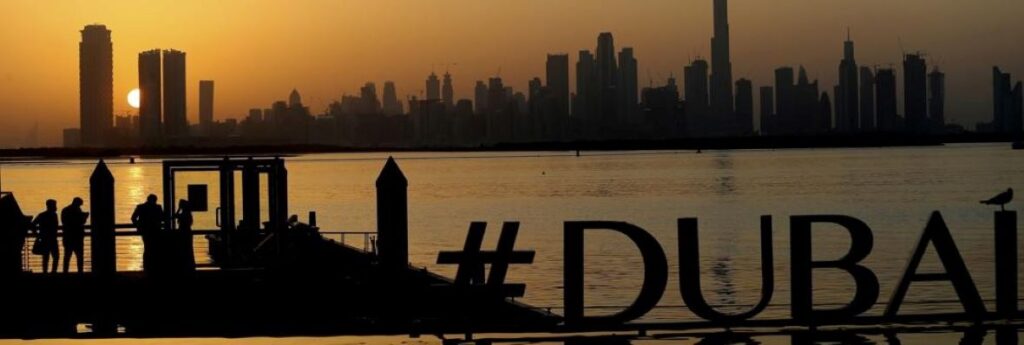The FIFA World Cup may be bringing as many as 1.2 million fans to Qatar, but the nearby flashy emirate of Dubai is also looking to cash in on the major sports tournament taking place just a short flight away.
Some soccer fan clubs have already said they’ll be commuting to Qatar during the cup on 45-minute flights from Dubai, the skyscraper-studded, beachfront city-state in the United Arab Emirates. Other fans plan to sleep on cruise ships or camp out in the desert amid a feverish rush for rooms in Doha.
Dubai’s airlines, bars, restaurants, shopping malls and other attractions now hope to benefit, further boosting their rebounding tourism industry in the crucial fall and winter months after the blows delivered by the coronavirus pandemic.
“If you can’t stay in Qatar, Dubai is the place you’d most like to go as a foreign tourist,” says, a Middle East and North Africa expert James Swanston. “It’s somewhere safe, somewhere more liberal in terms of Western norms. It’s the most attractive destination.”
Now home to the world’s tallest building, cavernous malls — including one with an indoor ski slope – and thriving nightclub scene, Dubai has seen explosive growth fueled by its boom-and-bust real estate market that’s transformed the one-time pearling village over the last 20 years.
Its long-haul carrier Emirates helped make Dubai International Airport the busiest in the world for foreign travel and provides a steady stream of new visitors who stay for layovers or longer. And while still an autocratic sheikhdom like its other Gulf Arab neighbours, Dubai has a relatively more-liberal view on drinking and nightlife.
In the lead-up to the tournament, concerns about hotel room space and high prices for the rooms available have trailed Qatar, which lacks hotel capacity for all teams, workers, volunteers, and fans at the World Cup. So Doha has created camping and cabin sites, hiring cruise ships, and encouraging fans to stay in neighbouring countries and fly in for games.
Qatar has estimated it will have 45,000 hotel rooms for the tournament.
Surrounding nations, like Bahrain, Kuwait, and Saudi Arabia, also suggest they could see a spike in visitors – even though Bahrain is the only among them that allows alcohol. Even Iran, months ago, suggested developing plans for World Cup tourists to stay on its Kish Island. Apparently, nothing came of the idea and now the Islamic Republic is gripped by nationwide protests.
Meanwhile, Dubai has over 140,000 hotel rooms, putting it easily into the top 10 destinations worldwide as far as available hotel rooms go, says Philip Wooller, a senior director at STR, a company that monitors the hotel industry. Dubai also offers price ranges greater than what Qatar can at the moment, given the demand.
“I think Dubai is an incredibly eclectic city,” Wooller says. “You can buy a room for $100 or you can buy a room for $5,000.”
Still, he adds that he expects “Qatar will be able to accommodate most of the fans coming to the World Cup (but) there will be a knock-on in Dubai.”
Dubai appears fully poised to take advantage of the tournament.
Its low-cost carrier, FlyDubai, plans as many as 30 round-trip flights a day during the World Cup, shuttling fans between Dubai’s Al Maktoum International Airport at Dubai World Central, or DWC, in the city-state’s southern reaches, to Doha International Airport, Qatar’s old main airport.
Other airlines that may use Al Maktoum airport include KLM, Qatar Airways and Wizz Air, while private jets will fly from there as well to the tournament, said Paul Griffiths, CEO of Dubai Airports. That could help boost the profile of an airfield that Dubai hopes will expand in the future as Dubai International Airport nears its capacity.
“It’s a great experience for us to see DWC suddenly so busy for the World Cup,” he says. “It will give exposure to the convenience of the airport for so many people that (airlines may) actually favor operating from there.”
The expected economic boost from the World Cup for Dubai comes after its turnaround since suffering through the pandemic. It spent billions for its delayed Expo 2020 world’s fair – which largely attracted visitors already in the UAE.
The UAE dropped its mandatory mask policy about a month ago.

